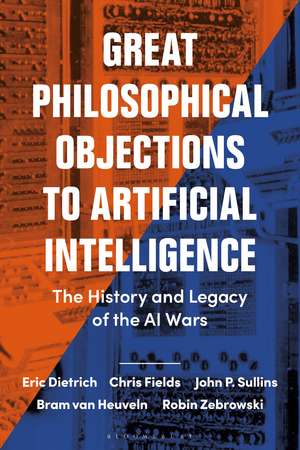Great Philosophical Objections to Artificial Intelligence: The History and Legacy of the AI Wars
Autor Eric Dietrich, Chris Fields, John P. Sullins, Bram Van Heuveln, Robin Zebrowskien Limba Engleză Paperback – 13 ian 2021
| Toate formatele și edițiile | Preț | Express |
|---|---|---|
| Paperback (1) | 227.34 lei 3-5 săpt. | +71.77 lei 4-10 zile |
| Bloomsbury Publishing – 13 ian 2021 | 227.34 lei 3-5 săpt. | +71.77 lei 4-10 zile |
| Hardback (1) | 658.52 lei 6-8 săpt. | |
| Bloomsbury Publishing – 13 ian 2021 | 658.52 lei 6-8 săpt. |
Preț: 227.34 lei
Preț vechi: 274.68 lei
-17% Nou
Puncte Express: 341
Preț estimativ în valută:
43.51€ • 44.95$ • 36.21£
43.51€ • 44.95$ • 36.21£
Carte disponibilă
Livrare economică 04-18 martie
Livrare express 15-21 februarie pentru 81.76 lei
Preluare comenzi: 021 569.72.76
Specificații
ISBN-13: 9781474257107
ISBN-10: 1474257100
Pagini: 312
Dimensiuni: 156 x 234 x 28 mm
Greutate: 0.5 kg
Editura: Bloomsbury Publishing
Colecția Bloomsbury Academic
Locul publicării:London, United Kingdom
ISBN-10: 1474257100
Pagini: 312
Dimensiuni: 156 x 234 x 28 mm
Greutate: 0.5 kg
Editura: Bloomsbury Publishing
Colecția Bloomsbury Academic
Locul publicării:London, United Kingdom
Caracteristici
Offers a new approach to studying, teaching and understanding the philosophy of AI by using the attacks it has received to introduce the main ideas and debates
Notă biografică
Eric Dietrich is Professor of Philosophy of Binghamton University, USA. Chris Fields is an independent scholar based in France. John P. Sullins is Professor of Philosophy at Sonoma State University, USA. Bram Van Heuveln is Lecturer in the Cognitive Science Department at Rensselaer Polytechnic Institute, USA. Robin Zebrowski is Associate Professor of Cognitive Science, Chair of the Program in Cognitive Science, Beloit College, USA.
Cuprins
List of FiguresPrologue: The AI Wars and BeyondPart I. The AI WarsIntroductionThe First War: Is AI Even Possible? 1. Gödel and Foundational Objections to AI2. How Would We Know If a Computer Was Intelligent? The Turing Test is Not the AnswerThe Second War: Architectures of the Mind3. How Computer Science Saved the Mind4. Implementing an IntelligenceThe Third War: Mental Semantics and Mental Symbols 5. The Strange Case of the Missing Meaning: Can Computers Think About Things?The Fourth War: The Frame Problem: Rationality and Creativity6. What is Relevant to What?: The Frame ProblemPart II. Beyond the AI Wars: Issues for TodayIntroduction7. What about Consciousness?8. Ethical Issues Surrounding AI Applications9. Could Embodied AIs be Ethical AgentsNotesBibliographyIndex
Recenzii
The book resembles a buffet meal offering many appealing individual pieces ... [and] makes philosophical arguments on AI accessible to non-philosophers-itself an important accomplishment.
An extraordinary book that does what scientists all too often don't do: highlight what is still unknown and lay the foundations for future development of a discipline. A must-read for both students and the experts of AI.
The promise and threat of artificial intelligence has sharpened debate on the nature of mind, morality, selfhood, intelligence and consciousness. Great Philosophical Objections to Artificial Intelligence deftly presents the recent history of this debate, from Turing to today, with engaging explanations of the technical issues, key insights, current stalemates, and the impact of advances in cognitive neuroscience.
This book cuts an accessible and engaging trail through the past 70 years of philosophical contention over the very possibility of artificial intelligence (AI) and some of its implications. It hits the sweet spot of providing a wonderful resource for the student and practitioner of the philosophy of AI and its recent history, while also giving a general audience a window into how philosophy works. The AI wars have evolved; we may have moved on from some battle lines, but understanding how they were fought enriches our mental repertoire and arms us with tools that will help us tackle new fronts in our struggle to come to terms with AI.
An extraordinary book that does what scientists all too often don't do: highlight what is still unknown and lay the foundations for future development of a discipline. A must-read for both students and the experts of AI.
The promise and threat of artificial intelligence has sharpened debate on the nature of mind, morality, selfhood, intelligence and consciousness. Great Philosophical Objections to Artificial Intelligence deftly presents the recent history of this debate, from Turing to today, with engaging explanations of the technical issues, key insights, current stalemates, and the impact of advances in cognitive neuroscience.
This book cuts an accessible and engaging trail through the past 70 years of philosophical contention over the very possibility of artificial intelligence (AI) and some of its implications. It hits the sweet spot of providing a wonderful resource for the student and practitioner of the philosophy of AI and its recent history, while also giving a general audience a window into how philosophy works. The AI wars have evolved; we may have moved on from some battle lines, but understanding how they were fought enriches our mental repertoire and arms us with tools that will help us tackle new fronts in our struggle to come to terms with AI.
